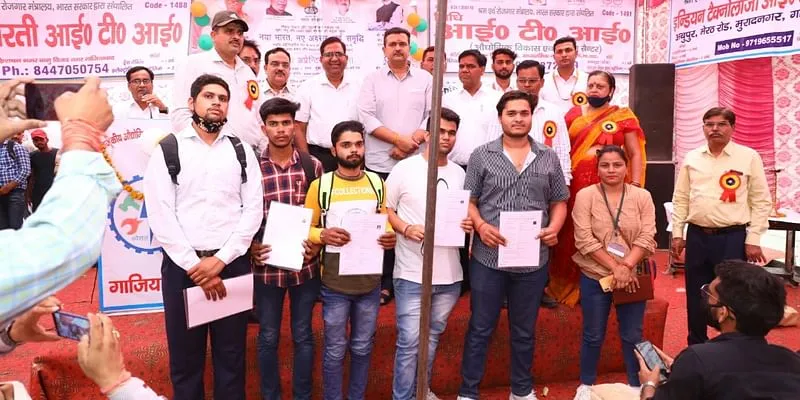RightWalk Foundation strives to make education accessible to all children in UP
The foundation battled challenges and resistance to bring about efficient implementation of the RTE policy in private schools. It aims to achieve institutional social change through public policy intervention in the areas of education, livelihood, and health.
A firm believer in equality, inclusion and social justice, Samina Bano is a ‘policy entrepreneur’ driving institutional and sustainable social change through public policy interventions. She envisions transforming poor households into sustainable households.
Samina works towards making public welfare schemes more accessible through policy advocacy and unlocking public funds. Her vision is deeply ingrained in the programmes of , a not-for-profit founded by her in 2017 in Uttar Pradesh. Before this, she had started Bharat Abhyudaya Foundation, which focused on improving learning outcomes in government and aided schools in the country.

Samina Bano, Founder, RightWalk Foundation, interacting with children
The policy entrepreneur began her journey in the policy domain by working on Section 12(1)(c) of the Right to Education Act (RTE). The Act mandates that private non-aided schools must reserve 25% of the total seats at entry-level classes for children from economically weaker sections and disadvantaged groups.
RightWalk Foundation worked on policy reforms and also on the ground to ensure the efficient implementation of RTE in the state.
“Our intervention in RTE in Uttar Pradesh brought a historical change that impacted and mainstreamed over 4,70,000 marginalised children across 75 districts and 16,000 schools within 7 years,” Samina tells SocialStory.
In 2020, the foundation designed another programme to activate the Apprenticeship Act 1961 in Uttar Pradesh. Samina believes that efficient implementation of the Act could address the problem of unemployment among the youth and rapidly develop a skilled workforce for the industry by combining studies with on-the-job training and remuneration. Within 1.5 years of work on the Act, her foundation claims to have successfully unlocked Rs 100 crore of public funds for the apprenticeship programme.
Understanding the education system
Samina gave up a lucrative career in consulting in the US in 2012 to work actively in the development and policy sector. Driven by the desire to make education accessible to children from weaker socio-economic backgrounds, she decided to study the RTE Act in detail.
An in-depth analysis of the Act and the education system in the country helped her realise that inclusion of underprivileged children in the classrooms of private schools could help challenge social hierarchy and economic inequality. She found Section 12(1)(c) under RTE to be a powerful tool to enable children from different socio-economic backgrounds to share the same classroom in private schools.
However, while the Constitution has provided directions to states for inclusive elementary education, they are not implemented efficiently.
Challenges in RTE implementation
Samina’s research and analysis revealed that Uttar Pradesh had a dismal record in the implementation of the RTE policy in private schools. Fair implementation of the policy was made difficult due to a number of challenges such as lack of political will, unwilling bureaucratic machinery, and a strong nexus of private schools resisting policy reforms in RTE.
Samina decided to implement the policy reforms under RTE in the state of Uttar Pradesh. According to her, before 2017, admissions under RTE were taking place via the offline mode, which limited the reach of the policy. There were also multiple logistical challenges. For instance, people had to travel to block offices for receiving and submitting documents. The process often discouraged potential applicants from applying for admission.
Tech-enabled assistance
After a thorough comparative analysis of the RTE portals of other states, RightWalk Foundation assisted the District Education Office in developing the state’s RTE online portal in 2017. The foundation partnered with the Government of Uttar Pradesh to build a technology-enabled integrated RTE online admission system in collaboration with the National Informatics Centre.

A batch of candidates who were issued apprenticeship contracts
Learning support
While efficient implementation of RTE ensures children from economically weaker sections are enrolled in private schools, the admission itself doesn’t lead to guaranteed learning or equal opportunities for everyone. The children from these sections need support to understand various subjects and academic concepts. A large number of parents are unable to support their children in learning. Private tuitions are costly and out of reach for such families.
To bridge the gap and ensure continued learning after school hours, RightWalk Foundation launched a post-admission learning support for the children enrolled in schools under RTE.
Under the project, digital learning support was provided to children at home through PRADIGI, an app-based learning application.
The foundation also started the project FABLE to provide academic support for learning after school. The project provides educational assistance, enabling 250 students of economically weaker sections, admitted under RTE 12 (1)(c), to access online after-school learning support to improve their retention and learning.
“We are also developing an RTE App, which will help the parents to understand social inclusion, periodic child tracking, and parent community livelihood support programmes,” says Samina.
Facing resistance
One of the biggest challenges the foundation faced was the fierce court battle fought against the private schools lobby, which was opposing the implementation of Section 12(1)(c) under RTE. The foundation won the battle, which was spearheaded by Samina. Her efforts resulted in key policy reforms in the RTE Act in Uttar Pradesh.
“The roller coaster ride of convincing the government people and hosting multiple training sessions paid off and we successfully built a unique partnership with the Government of Uttar Pradesh, supporting them as a project management unit,” says the entrepreneur.
Impact of the initiatives
The partnership with the UP government has been immensely successful, having enrolled over 4,70,000 children from economically weaker sections into 16,000 private classrooms across the state in the last seven years.
The foundation’s continuous efforts led to the unlocking of over Rs 350 crore of public money for the RTE Act, which was distributed to the public in the form of financial aid and private school reimbursements. One rupee spent by RightWalk unlocked Rs 100 of public finance to be disbursed for welfare schemes.
The team from the foundation engages closely with private school educators and trains them on inclusive pedagogical practices to facilitate seamless integration of children from economically weaker sections in diverse classrooms. The foundation has trained over 2,000 educators across 12 districts of UP in partnership with UNICEF and the state government. The foundation is also planning an inclusion-centric curriculum to be shared online for the benefit of more teachers.
RightWalk Foundation gets its funds from institutional donations. Its donors include Nudge Accelerator and Veddis Foundation.
Plans ahead
In the next five years, the foundation will work on the implementation of five policies focusing on the areas of education, livelihood, and health.
“We aim to impact 10 million people, giving special attention to girls and people with disabilities,” says Samina.
Edited by Swetha Kannan








